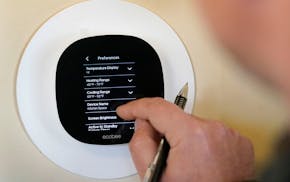As a hardhearted detective might say, dead disk drives tell no tales. Or at least they don't after two Twin Cities companies are done with them.
Worried about data and identity theft, businesses are paying good money to have old computer disk drives beaten to a pulp so that their information can't be stolen.
At the Secure 360 computer security conference in St. Paul last week, Charlie Gaetz held up a plastic bag of metal confetti.
"You'll have a hard time recovering any information from that disk drive," said Gaetz, an account representative for Shred-it Minnesota, a 68-employee data-destruction company in Brooklyn Park.
Twenty feet away, Ryan Laber of St. Paul-based Asset Recovery Corp. was smashing disk drives using an enclosed punch press that mangled the units with 12,000 pounds of pressure.
"Most people think you can destroy a hard disk with a hammer or a drill," said Laber, the director of outside sales for Asset Recovery, which has 60 employees.
"But a hammer may not destroy a drive with two data disks, and a drill destroys only part of the disk. Our machine smashes the drive electronics into all the disks."
Companies as dissimilar as banks and hospitals are paying to have their disk drives destroyed, as a good security practice as well as to comply with federal government privacy regulations such as HIPAA (Health Insurance Portability and Accountability Act), Sarbanes-Oxley (Public Company Accounting Reform and Investor Protection Act) and FACTA (Fair and Accurate Credit Transactions Act).
To help companies show their banks and accountants that they complied with these government mandates, Shred-it and Asset Recovery offer to bring their disk-destruction equipment to a company's office, obliterate the disks in front of customer witnesses and provide written certification of the destruction. It costs about $10 a disk.
They are two of a handful of companies offering disk-drive destruction in the Twin Cities. Competition is so fierce that the companies even brag about the speed of their service. Asset Recovery says it can smash one disk drive every 15 seconds. Shred-it says it can pulverize a drive in about 6 seconds.
Of course there are other ways to get rid of data besides smashing a disk drive. "Disk eraser" programs overwrite a disk seven times with zeros or random numbers -- something that Asset Recovery offers as an option. There also are devices that wipe disks clean using magnetic fields, a process called "degaussing."
Overwriting may not do it
So why the appetite for destruction?
"Overwriting the information on a disk may be enough to destroy the data, but there are a lot of savvy criminals out there," said Josh Meyer, a facilities specialist at St. Paul's Bremer Bank who uses the Shred-it service to destroy 50 disk drives a year. "Even if the odds are very small that something might happen to that data, they're never small enough unless they're zero -- so we're zeroing out the chances."
Asset Recovery crushes disks as part of its computer recycling operations, which also include services such as removing corporate asset tags before reselling used computer equipment on behalf of a corporation. While the company sells its crushers for $5,000 each, it says most customers would rather buy the service than do it themselves.
Shred-it pulverizes disk drives as an extension of its 20-year-old document shredding business; the disk drives are shredded in similar machines with a 40-inch-long rotating shaft with knife blades every half-inch. The firm, a privately owned franchisee of Shred-it, a Canadian company, won't sell its machines because they contain proprietary technology.
Both companies say they're environmentally friendly, because they send out the remnants of destroyed disk drives for reclamation of the aluminum, copper and lead they contain and appropriate disposal of the rest.
Asset Recovery also destroys other computer-like devices that hold data, such as magnetic backup tapes, personal digital assistants, cell phones and copiers. Shred-it also destroys DVDs and CDs, backup tapes and finger-size flash drives.
Both companies focus on businesses, but they'll also provide services to consumers. Asset Recovery will destroy your disk drive as part of recycling your old computer and monitor for about $30.
Rising sales of disk drives in 2007 -- unit shipments rose 18.9 percent worldwide last year according to California research firm iSuppli Corp. -- suggests that the two firms may be in the destruction business for a long time to come.
"Most people are still not aware that you can destroy a disk drive the way we do," said Tom Vettel, president of Shred-it Minnesota.
"Once it becomes more popular, it could be a real growth market."
Steve Alexander 612-673-4553

